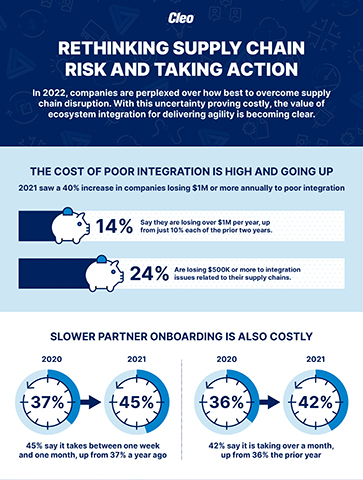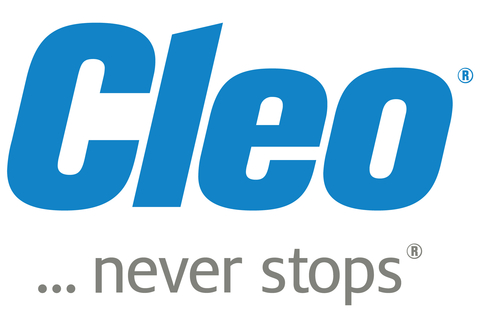2022 Market Report: Cleo Survey Finds 40% Increase in Companies Losing Over $1 Million Annually Due to Poor Integration, Lack of Supply Chain Agility
2022 Market Report: Cleo Survey Finds 40% Increase in Companies Losing Over $1 Million Annually Due to Poor Integration, Lack of Supply Chain Agility
7 in 10 believe Ecosystem Integration can deliver cost savings and boost profitability
ROCKFORD, Ill.--(BUSINESS WIRE)--According to the 2022 State of Ecosystem and Application Integration Report, an annual survey published by Cleo, companies’ inability to outsmart supply chain disruption is gravely impacting their revenue and profitability, and the losses are mounting at an increasing rate.
While 85% of companies say they are losing money to integration issues related to their supply chains, nearly a quarter of companies (24%) are losing $500,000 or more. More worrisome, an increasing number, 14%, say they are losing over $1 million per year, up from just 10% each of the prior two years, reflecting a 40% year-over-year uptick.
What is causing these mounting losses?
According to Cleo’s survey, it is largely coming from outdated integration systems and poor business-process integration with their ecosystems. Due to a lack of end-to-end business process visibility, about half (49%) of all businesses don’t really know what’s happening at key integration points across their business transactions. More fundamentally, companies are split over whether it’s their own integration technology or process shortcomings or that of their business partners that’s really to blame.
Beyond the financial losses, the amount of time it takes to onboard new business partners is also increasing.
In 2021, 45% of integration experts surveyed said it took between one week and one month to onboard a new supply chain partner, up from 37% the year before. And 42% say it is taking over a month, up from 36% the prior year. These delays directly impact revenue, vendor scorecards, and customer satisfaction. The root causes for these delays can be found not with poor partner performance, but internally with the companies themselves, where outdated legacy or homegrown applications, overreliance on manual processes, or too much custom code are hindering partner onboarding for over 50% of businesses. Additionally, the dwindling availability of skilled talent was cited by 37% of respondents as yet another top challenge impacting partner onboarding.
“Among business leaders surveyed, supply chain disruption was viewed as second only to cyberthreats as the greatest external risk to their business. Yet many companies are perplexed over how supply chain disruption can be overcome,” says Tushar Patel, CMO of Cleo. “They know more automation is needed for supply chain agility, but some still question whether their problems originate internally or with business partners. ‘Is it them or is it us?’ they wonder, and this uncertainty is stalling investment decisions for some organizations. Meantime, they’re bleeding profits and damaging important business relationships.”
The good news is an increasing number of respondents believe that modern cloud-based solutions for B2B integration can help them remedy the situation. Sixty-nine percent – up from 66% in 2020 and 63% in 2019 – believe ecosystem integration technology can deliver cost savings and boost their bottom line. And 4 out of 5 companies (81%) claim they have begun or will begin migrating their integration capabilities to the cloud over the next 12 months, for its greater data security and control.
What Is Ecosystem Integration?
Ecosystem Integration is a new category of software, principally for supply-chain-driven companies, where a single cloud-based platform is used for file-based, EDI, and application integration to optimize end-to-end integration processes across a dynamic network of trading partners, applications, suppliers, customers, and marketplaces. Ecosystem Integration takes the best of B2B integration and iPaaS technologies and combines them with a layer of visibility that empowers organizations to optimize business processes and quickly resolve errors when they occur.
Ecosystem Integration is seen as driving cost savings while leveraging automation to give companies the agility and control needed to outsmart supply chain disruption and create value for their business in myriad ways:
- More than half (54%) believe Ecosystem Integration can help them improve their performance against Service Level Agreements (SLAs) and reduce violations (24%).
- About half see automating end-to-end integration to eliminate manual processes (51%) and integrating new applications more quickly (47%) as driving the most value for their business ecosystem.
- For about one-third of respondents, replacing legacy integration solutions (36%) and having a flexible and highly available integration architecture (33%) is important.
- Additional benefits expected from Ecosystem Integration are faster order processing (43%), happier customers (42%), and fewer lost orders (26%).
“The chronic challenges of 2021 made it apparent that supply chain issues were in large part due to a lack of agility which could have allowed companies to rapidly sense and intelligently respond to any type of disruption,” Patel continued. “The survey results show it is no longer a question of whether or why companies should invest in ecosystem integration technology; it’s now a question of how and when. Organizations need to wake up and take immediate action, and ecosystem integration gives them the best choice for where to begin.”
Download the Report
Cleo’s 2022 State of Ecosystem and Application Integration Report -- “Rethinking Supply Chain Risks & Taking Action” -- is available online at no cost. To learn more about the latest integration trends impacting today’s manufacturing, logistics & transportation, and wholesale distribution industries, view the Infographic or click here to access the full 2022 State of Ecosystem and Application Integration Report.
About the Report
The primary research goal was to understand the top business risks to business in 2021, as well as challenges of building and maintaining enterprise B2B integrations, partner onboarding, and real-world profit loss from integration issues. Additionally, the research sought to understand how these issues changed over the three years of the study (2021, 2020, 2019) and capture business impact of integration issues and COVID-19. A total of 323 qualified participants that design, build and manage applications or infrastructure integrations completed the survey. Participants were from North America and Europe.
About Dimensional Research
Dimensional Research® provides practical market research for technology companies. We partner with our clients to deliver actionable information that reduces risks, increases customer satisfaction, and grows the business. Our researchers are experts in the applications, devices, and infrastructure used by modern businesses and their customers. For more information, visit www.dimensionalresearch.com.
About Cleo Integration Cloud
Cleo Integration Cloud (CIC) is a cloud-based integration platform, purpose-built to design, build, operate and optimize critical ecosystem integration processes. The CIC platform brings end-to-end integration visibility across API, EDI and non-EDI integrations that gives technical and business users the confidence to rapidly onboard trading partners, enable integration between applications, and accelerate revenue-generating business processes. On the platform, businesses have the choice of self-service, managed services, or a blended approach – ensuring complete flexibility and control over their B2B integration strategy.
About Cleo
Cleo is an ecosystem integration software company focused on business outcomes, ensuring each customer’s potential is realized by delivering solutions that make it easy to discover and create value through the movement and integration of B2B enterprise data. Cleo gives customers strategic, “outside-in” visibility into the critical end-to-end business flows happening across their ecosystems of partners and customers, marketplaces, and internal cloud and on-premise applications. Our solutions empower teams to drive business agility, accelerate onboarding, facilitate modernization of key business processes, and capture new revenue streams by reimagining and remastering their digital ecosystem through robust application, B2B, and data integration technologies. For more information, visit www.cleo.com or call +1.815.282.7695.
Contacts
Kathleen See
10Fold Communications on behalf of Cleo
cleo@10fold.com

